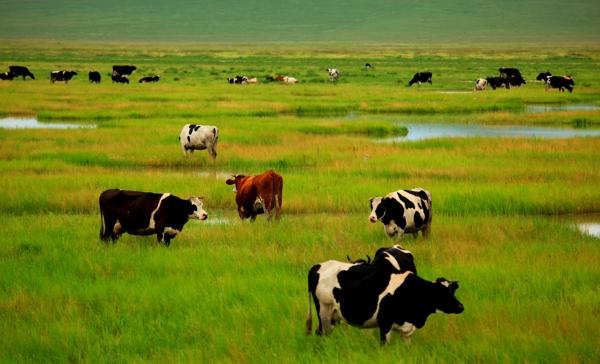<h1>During the rainy season, it is necessary to strictly prevent chicosis in cattle and sheep</h1>
Since the spring of this year, the temperature in our province has suddenly risen, the peach blossom water is larger, and most of the areas have recently been in the rainy stage. During the hot and rainy season, low-lying grasslands will accumulate water to form puddles, and if grazing cattle and sheep drink water from puddles contaminated with trematode eggs, trematode disease may occur. The intermediate hosts of trematodes are various land snails, freshwater snails or ants and grasshoppers (Nian Zhong, an arthropod that lives on grasslands, resembling grasshoppers — author's note), and cattle and sheep can also contract trematodiasis after eating them. The following trematodes eggs in grasslands or puddles can infect cattle and sheep.

First, the infection of the digestive system is:
1. Flaky trematodes (liver flukes): parasitic in the liver and bile ducts of cattle and sheep, can be parasitic in cattle and sheep for 3-5 years, and the intermediate host is a variety of snails.
2. Biluminal flukes: parasitize in cattle, sheep bile ducts and gallbladder, the intermediate host is ants, cattle and sheep due to the ingestion of ants and the disease. The onset season is mostly in spring and autumn.
3. Broad-disc trematodes: the intermediate host is a land snail, which enters the pancreas through the duodenum after being swallowed by cattle and sheep.
4. Anterior and posterior disc trematodes: parasitized in the cecum and rumen of cattle and sheep, the intermediate host is freshwater snails, and cattle and sheep in our province are mostly infected in May-October.
Second, the infection of the circulatory system is:
1. Japanese schistosomiasis: infection through digestion, is a predisposing disease in humans and a variety of mammals.
2. Dongbi fluke disease: the intermediate host is an earth snail, mostly infected in May to October.
3. Symptoms of onset
The disease is mostly chronic, suffering from depressed spirits, loss of appetite, rough hair, submandibular, chest and abdomen edema, diarrhea, anemia. Acute loss of appetite, increased body temperature, depression, 3-5 days of illness, death due to exhaustion.
Fourth, the autopsy changes
The parasitic sites of the worm body (eg, liver, bile duct, pancreas, intestinal duct) are enlarged, necrotic, and there are worm bodies or worm tracts.
5. Diagnosis
According to the characteristics of the onset of the disease two months after grazing, the above symptoms can be seen in the onset of cattle or sheep to make a preliminary diagnosis. Live animals can take the feces of suspected sick animals, rinse and collect eggs, and diagnose them by microscopy. Typical organ lesions may be seen on autopsy in cases of death.
6. Treatment
After the diagnosis, a combination of drugs is required, and the areas with multiple occurrences should be detoxified in spring and autumn. Effective drugs are:
Nitrochlorophenol: 3-4 mg per kg of body weight in cattle and 4-5 mg per kg of body weight in sheep, taken orally at one time. Injections are 0.5-1.0 mg per kg of body weight.
Propylthiazole: 10-15 mg per kg of body weight for cattle and 5-10 mg per kg of body weight for sheep, taken orally at one time.
Thiodichlorophenol (allidine): 40-50 mg per kg of body weight for cattle and 80-100 mg per kg of body weight for sheep, taken orally at one time.
Levamisole: 15-20 mg per kg of body weight for cattle and 10-15 mg per kg of body weight for sheep, taken orally at one time.
Praziquantel: 35-45 mg per kg of body weight in cattle and 20-30 mg per kg of body weight in sheep, taken orally at one time.
Prevention
At present, no trematode seedlings have been developed for immunization, and the production mainly relies on strengthening feeding management and eliminating intermediate hosts (various snails); the disease-prone areas should be dewormed every spring and autumn; in grazing areas, from March to May every year, one-thousandth of copper sulfate is sprayed with water in the depression, artificial snail control or chicken snail control. It is best to graze sheep in meadows with stagnant water in depressions. Cattle and sheep must drink enough clean water before grazing, so as not to drink stagnant water contaminated with insect eggs in the pasture, because the sheep like to clean and will not drink dirty water until they are very thirsty.
Source: Plough
Author: ■ 12582 Agricultural Information and Communication Veterinary Expert Liu Qinghe
Editor: Li Meng
If reproduced, please indicate the source